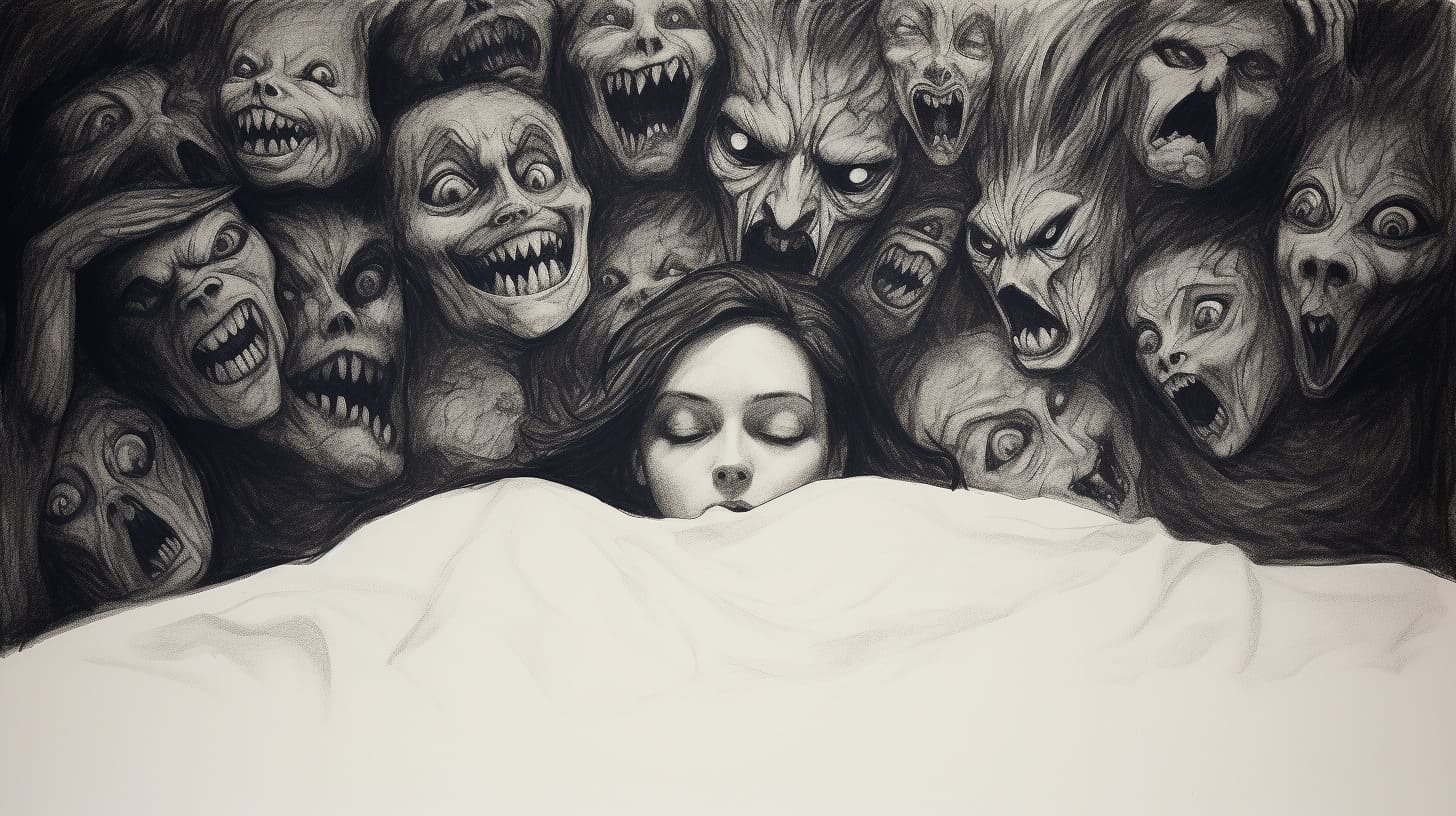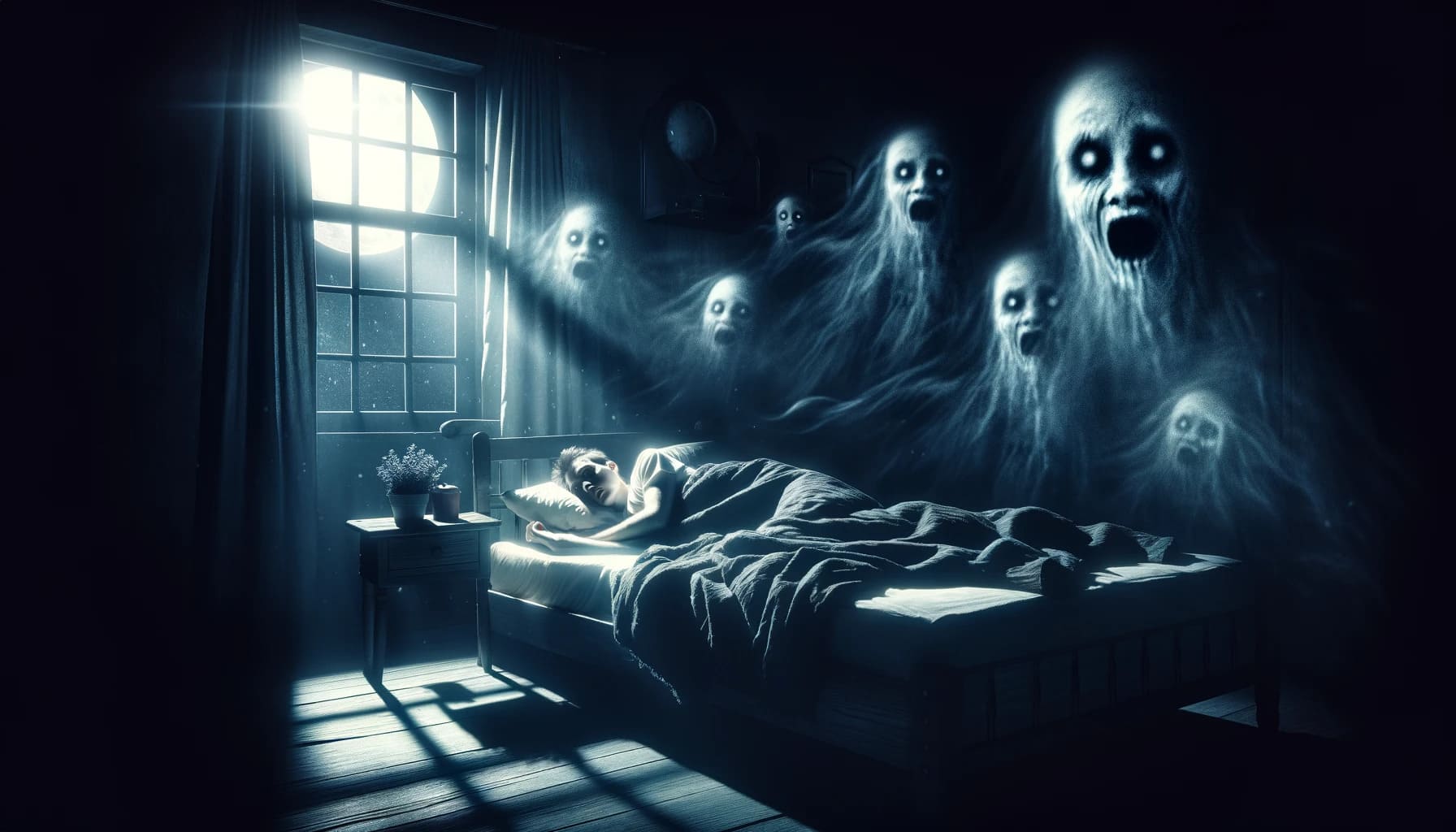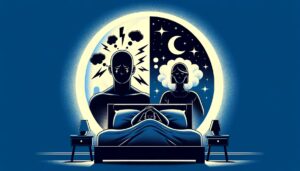Sleep paralysis is a curious phenomenon that strikes as one drifts from wakefulness to sleep, and vice versa. While not harmful, the experience can be terrifying for many, evoking fears of immobility and spectral apparitions that seem all too real during the episode.
What is Sleep Paralysis?
Sleep paralysis occurs during transitions between the wakefulness and REM (Rapid Eye Movement) sleep. This stage is vital for dreaming, but what happens when it doesn't go smoothly? Here lies the crux of sleep paralysis.
During REM, our brain sends signals that paralyze our skeletal muscles — it's a protective measure to prevent us from acting out our dreams and potentially hurting ourselves. However, when we experience sleep paralysis, this mechanism unfolds while we're conscious, leading to an overlap where the mind is alert but the body remains in a dream-bound paralysis.
Key Points about REM Sleep and Paralysis:
- REM Sleep: The sleep phase where most dreaming occurs.
- Muscle Paralysis: Prevents physical enactment of dreams.
Symptoms of Sleep Paralysis
Anyone who has experienced sleep paralysis can testify to its unsettling nature. The primary symptom is the inability to move or speak right after waking up or when falling asleep. Imagine feeling conscious yet unable to call out or move — it's not hard to see why it can be a distressing situation.
But there's more than just paralysis:
- Pressure Sensation: Many feel a weight on their chest, making it hard to breathe.
- Hallucinations: Vivid, often frightening visions or sounds are common.
- Fear and Anxiety: The experience can be emotionally charged due to the vividness of hallucinations.
Individual experiences can vary significantly, adding a layer of personal narrative to each episode.
Causes and Triggers of Sleep Paralysis
Understanding what might trigger sleep paralysis can provide some solace and ways to possibly avoid it. Common triggers include irregular sleeping patterns and lifestyle stress. However, some medical conditions like narcolepsy can also predispose individuals to these episodes.
Common Triggers:
- Irregular Sleep Schedules: Shift work or jet lag.
- Stress: High stress levels can disrupt sleep and lead to paralysis episodes.
- Sleep Disorders: Such as narcolepsy or sleep apnea.
The Safety of Sleep Paralysis
Despite the horror stories, sleep paralysis is not a door to the grim reaper. There are no direct mortal dangers linked to the phenomenon itself. The body has mechanisms that continue breathing and generally look after our vital functions even when our voluntary muscles are on a temporary lockdown.
Reassuring Facts:
- Breathing: Autonomic functions like breathing are maintained.
- Temporary: Episodes are usually brief, typically lasting a few seconds to a few minutes.
- Consciousness: You remain fully conscious and aware, which means safety measures are mentally intact.
Dispelling myths about sleep paralysis is crucial. Understanding that it’s a common, albeit unsettling, sleep phenomenon can alleviate unnecessary fears and promote better handling of the episodes when they do occur. Also incorporating an image related to the subject might help visualize its non-lethal nature.
In wrapping up this overview, remember that while sleep paralysis can be a distressing experience, it is generally not hazardous to your health. With the right approach and understanding, one can manage or even decrease the frequency of these episodes.
Experiences with Sleep Paralysis
Let’s enter the world of those who've experienced sleep paralysis, drawing from a mosaic of individual stories. These accounts vary widely, providing us with insight into the psychological and emotional reactions triggered by these episodes—from mere curiosity to intense distress.
- Diverse Accounts: Some individuals recall episodes with a sense of intrigue, puzzled by this peculiar twist in their sleep patterns. Others describe feelings of dread, with experiences so vivid they blur the lines between dreams and reality.
- Emotional Responses: The intense fear of not being able to move or speak can escalate to panic, especially with the added layer of distressing hallucinations often reported, such as shadowy figures or the sensation of choking.
Understanding these diverse personal experiences is key to grasping the full spectrum of sleep paralysis's impact on mental and emotional wellbeing.
Expert Opinions on Sleep Paralysis and Mortality
Seeking clarity on the pressing concern: is sleep paralysis lethal? Insights from sleep specialists and up-to-date research offer a resounding no, but let's delve deeper into the expert analysis to ground our understanding in solid evidence.
- Research Insights: Extensive studies highlight that while sleep paralysis can be psychologically taxing, there is no direct link to fatal outcomes purely from the paralysis itself.
- Medical Assurance: Physicians affirm that the body’s vital functions, such as breathing, are not compromised during these episodes. The fear, although profound, does not translate into physical danger.
These expert opinions bolster our understanding, reaffirming that sleep paralysis, while deeply unsettling, is not a death sentence.
Managing and Preventing Sleep Paralysis
Given the discomfort associated with sleep paralysis, what proactive steps can be taken to manage or prevent it? Here's practical advice rooted in improving sleep hygiene and lifestyle modifications:
- Establish Regular Sleep Patterns: Going to bed and waking up at consistent times reinforces your body's sleep-wake cycle.
- Sleep Environment Optimization: Ensure your sleeping space is comfortable, quiet, and dark. This encourages uninterrupted sleep, reducing the chances of a paralysis episode.
When to Seek Professional Help:
- Recurring Episodes: If episodes become too frequent and interfere with your mental peace.
- Severe Distress: When the fear from the paralysis significantly impacts your day-to-day life.
Implementing these strategies might not only decrease the frequency of sleep paralysis but also alleviate the anxiety associated with the episodes.
Psychological Effects of Sleep Paralysis
While physically harmless, the psychological imprint of sleep paralysis can be profound. Let’s explore how recurrent episodes can affect mental health and what can be done to mitigate these effects.
- Mental Health Strain: Regular encounters with sleep paralysis can trigger anxiety disorders, and in some, lead to sleep anxiety or insomnia, where the fear of paralysis prevents restful sleep.
- Coping Mechanisms: Engaging with a therapist familiar with sleep disorders can be crucial. Cognitive-behavioral therapy (CBT) has shown effectiveness in addressing the fears associated with sleep paralysis.
Support networks also play an essential role by providing emotional solace and practical advice from those who’ve navigated similar experiences.
Conclusion
To wrap up, the belief that sleep paralysis could lead to death is largely unfounded. Far from being life-threatening, understanding, managing, and normalizing this sleep occurrence are crucial steps forward. By demystifying sleep paralysis and spreading awareness on management techniques, we foster an environment where these episodes can be approached with knowledge rather than fear. Aim to hold onto the knowledge that with the right strategies, the distress of sleep paralysis can be significantly reduced, leading to healthier sleep practices and overall well-being.







0 Comments